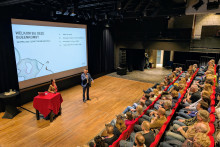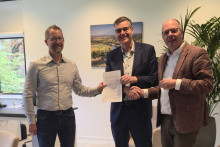The plan – for which 795 million euros has been budgeted – includes a major role for the UT (331.8 million). That amount must largely be covered by Beethoven. All the plans of the regions add up to much more than the amount available, because the regions have been asked to indicate 'the maximum possible at reasonable cost'.
Beethoven covers a broad package of measures with which the government wants to strengthen the Dutch microchip sector. Many of the measures are intended to support the growth of Brainport Eindhoven, because ASML plays an important role in the global chip industry. However, if ASML wants to grow, Twente must grow with it as an essential part of the supply chain, writes Twente Board chairman Ank Bijleveld in the Twente plan. She is referring to companies such as VDL, ETG, Demcon, NTS Norma, Benchmark Electronics and Technotion.
To meet the great need for well-trained talent, the government is allocating 450 million euros until 2030 and 80 million euros per year structurally thereafter. Twente, together with the regions of Delft, Groningen and Eindhoven, has been designated to come up with a plan. That was submitted this week.
10 thousand extra jobs
The plan expresses the expectation that the number of employees in the sector in Twente will double by 2030. Tech companies in Twente need about 10 thousand extra full-time jobs. That is why a total of 9,500 extra students will enrol in the Twente plan up to and including 2030, specifically in relevant programmes for the microchip sector. About half of that intake is university students. The UT hopes to have 2,200 extra Master's graduates by 2030 and a thousand extra students annually from 2030 onwards.
Growth must be achieved both nationally and internationally. There is also a need for more intensive recruitment and more focus on talent retention. Lifelong-learning is also expected to grow with an annual participation of 2,500 professionals, more than half of whom are from the microchip industry.
Challenging and ambitious
It will be interesting to see how Twente wants to attract more students. National student recruitment is 'challenging', according to the plan. The number of Dutch secondary school pupils opting for an NT profile has been declining for years. A large part of the absolute growth is to be found in international growth. That also sounds ambitious, since the new government's course does not necessarily sail internationally. Plans that the UT mentions to achieve growth are to make pre-bachelor's programmes accessible to students with an unsuitable set of subjects, to strengthen the role of study advisor to reduce drop-out rates and to realise a continuous learning pathway in the field of mechanical engineering.
To increase the stay rate of international students, various strategies are used in the plan, such as guidance, better housing and improved Dutch language skills.
For the 331.8 million euros budgeted for the UT, 272.1 million must come from Beethoven. The rest – 59.7 million – is budgeted as usual. All plans will now be assessed nationally, after which it will become clear which part of the regional plans will actually receive funding.






